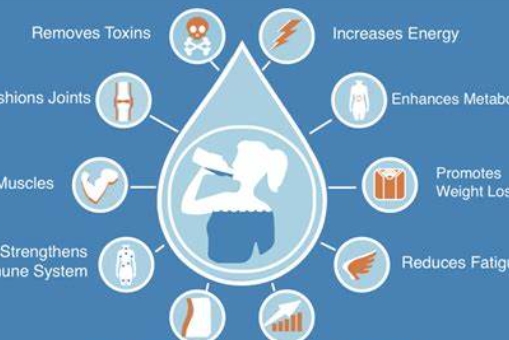Staying hydrated is one of the simplest yet most effective ways to improve your overall health and well-being. Water is essential for life, and proper hydration plays a key role in nearly every bodily function, from regulating temperature to supporting digestion and promoting cognitive function. Despite its importance, many people do not drink enough water throughout the day, often leading to dehydration, which can result in a range of negative health effects. Understanding the importance of hydration and how to maintain optimal fluid levels can help you feel your best every day.
The Role of Water in the Body
Water makes up approximately 60% of the human body, and it is involved in numerous physiological processes. Every cell, tissue, and organ relies on water to function properly. Some of the essential roles water plays in the body include:
- Temperature Regulation: Water helps regulate body temperature by dissipating heat through sweating and breathing. When the body becomes too hot, sweating helps cool it down, and water is necessary to replace the fluids lost in this process.
- Digestion and Nutrient Absorption: Water is essential for the breakdown and absorption of nutrients from food. It helps dissolve nutrients, making them easier for the body to absorb. Water also facilitates the movement of food through the digestive tract and prevents constipation by softening stool.
- Detoxification: Water is a key component of the body’s detoxification system. It aids in flushing out waste products and toxins through the kidneys, bladder, and sweat glands. Proper hydration ensures that the kidneys can effectively filter out harmful substances from the bloodstream.
- Joint Lubrication: Water helps lubricate and cushion joints, reducing friction and preventing stiffness or discomfort. This is especially important for those with active lifestyles or those suffering from conditions such as arthritis.
- Cognitive Function: The brain is composed of about 75% water, and even mild dehydration can negatively impact cognitive functions like concentration, memory, and mood. Staying hydrated helps maintain mental clarity and focus throughout the day.
Signs of Dehydration
Dehydration occurs when the body does not have enough water to carry out its normal functions. Even mild dehydration can lead to symptoms that can affect your daily activities. Some common signs of dehydration include:
- Thirst
- Dry mouth or skin
- Fatigue or dizziness
- Headache
- Dark yellow urine
- Decreased urine output
- Confusion or irritability
- Muscle cramps
If you experience any of these symptoms, it’s important to rehydrate immediately by drinking water or electrolyte-rich fluids. Chronic dehydration can lead to more serious health issues, such as kidney stones, urinary tract infections, and impaired cognitive and physical performance.
How Much Water Should You Drink?
The amount of water you need can vary based on factors like age, gender, activity level, climate, and overall health. However, a common recommendation is to drink at least eight 8-ounce glasses of water a day, often referred to as the “8×8 rule.” This equals about 2 liters or half a gallon of water per day.
While this is a general guideline, individual needs may differ. For example, people who exercise regularly, live in hot climates, or are pregnant or breastfeeding may need more water to stay properly hydrated. On the other hand, those with certain health conditions, like kidney problems or heart disease, may need to limit their fluid intake, so it’s always best to consult with a healthcare provider if you’re unsure about your hydration needs.
Ways to Stay Hydrated
Drinking water is the most obvious way to stay hydrated, but there are other ways to meet your fluid needs throughout the day. Here are some practical tips to help you stay hydrated:
- Drink water consistently: Instead of waiting until you’re thirsty, try to drink small amounts of water regularly throughout the day. Carry a water bottle with you to remind yourself to drink.
- Eat water-rich foods: Many fruits and vegetables have high water content and can contribute to hydration. Watermelon, cucumbers, oranges, strawberries, and celery are all excellent choices for boosting hydration.
- Drink hydrating beverages: In addition to water, beverages like herbal teas, coconut water, and milk can contribute to your daily fluid intake. However, try to avoid sugary or caffeinated drinks, as they can increase dehydration.
- Monitor urine color: One way to check if you’re staying hydrated is by monitoring the color of your urine. Clear or light yellow urine typically indicates proper hydration, while dark yellow or amber urine can be a sign that you need to drink more water.
- Hydrate before, during, and after exercise: If you’re engaging in physical activity, it’s essential to drink water before, during, and after exercise to replenish the fluids lost through sweat. For longer or more intense workouts, you may also consider drinking an electrolyte-replenishing beverage to maintain proper hydration levels.
Hydration and Weight Loss
Proper hydration can also play a role in weight management. Drinking water before meals can help reduce appetite, as it creates a feeling of fullness and may prevent overeating. In fact, some studies suggest that drinking water before meals can help you consume fewer calories and aid in weight loss.
Additionally, drinking water can help boost metabolism. Cold water, in particular, may cause the body to burn extra calories as it works to warm the water to body temperature. While this effect is modest, it can contribute to weight loss efforts when combined with a healthy diet and exercise.
Hydration and Skin Health
Water is essential for maintaining healthy, glowing skin. Proper hydration helps the skin retain moisture, which can improve elasticity, reduce the appearance of wrinkles, and prevent dryness. When the body is dehydrated, the skin can appear dull and dry, and fine lines may become more noticeable.
Drinking enough water also helps flush toxins from the body, which can contribute to clearer skin and reduce the likelihood of breakouts. In addition to drinking water, you can also hydrate your skin topically by using moisturizers that help lock in moisture and keep the skin barrier intact.
Conclusion
Hydration is a key component of overall health and well-being. Water is essential for various bodily functions, from regulating temperature to promoting digestion and supporting cognitive function. Staying hydrated helps maintain optimal health, prevents dehydration-related issues, and supports skin health. To ensure you’re drinking enough water, make it a habit to drink consistently throughout the day, incorporate hydrating foods into your meals, and monitor your urine color as a guide. By prioritizing hydration, you can feel more energized, improve your physical performance, and boost your overall quality of life.





